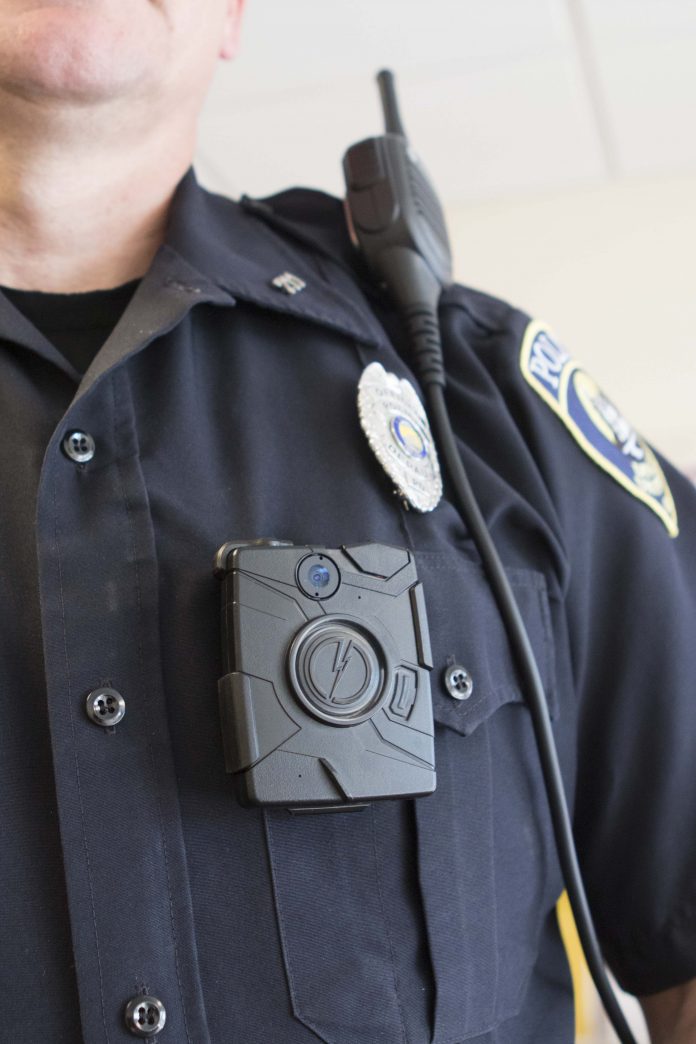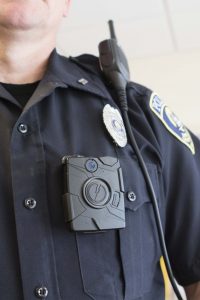

If you have a run-in with Public Safety this semester, smile, because you’re on camera.
Starting this summer, all eight of DePauw University’s Public Safety officers will be wearing body cameras that record the majority of the individual’s interactions with the public. Director of Public Safety, Angie Nally, said equipping officers with the cameras was first considered in the spring of 2015.
“That was when we were really, like, ‘we need to look into this technology and see if it’s something we can work with here at DePauw,’” Nally said.
After researching different styles, the department purchased one camera. This camera was used as a trial so formal procedures and policies around the use of the body cameras could be developed.
Starting this past summer, all eight Public Safety officers were equipped with body cameras, though they are still being used in a probationary period. The cameras cost about $500-700, but five of the eight cameras were paid for by a grant the department received, according to Nally.
Officers are required to use the cameras in instances such as traffic stops and arrests. Officers can choose not to activate the cameras while performing more of a community action, such as jumpstarting a dead car or helping a student locked out of his or her vehicle.
When officers heard of implementing body cameras, there was some early wariness. “Initially there was some concern just about not remembering not to turn it on when you’re supposed to turn it on and forgetting to turn it off and it recording moments officers would not want cameras on, like when they’re going to the bathroom,” Nally said.
This first reaction faded once officers were able to handle the cameras and read the department’s procedure.
Nally believes the cameras have positively affected how the officers and the community interact. “The students feel the officer is going to behave more professionally and more procedurally just, then they would if they weren’t being recorded,” said Nally. “The officers very much feel like the people they’re interacting with when they realize there is a recording of the situation, their behavior deescalates.”
Students have reacted positively to the cameras. “Having more accountability for everybody involved in all situations is just better,” said senior Jake Smith, “Just knowing there is a safeguard in place if police go overboard for whatever reason, or if anything happens, having that extra security makes me feel a little safer.”
Even students who were initially skeptical see it as a step in the right direction. “Typically I’m not a fan of cameras,” said senior Sam Parker, “When it comes to the police force I think it’s a good idea because all of these atrocities have been happening and nothing has been really getting done, so I think this is a good step towards accountability.”
The state of Indiana has recently delineated procedures regarding body camera footage in House Bill 1019 which was signed by Governor Mike Pence in March. The bill requires law enforcement to save footage for 190 days and delineates the process for releasing the recording to the public.
Some police departments say retaining footage for the 190 days is not financially feasible, and have abandoned the cameras, according to the Indianapolis Star.
DePauw Public Safety has also felt the financial strain of storing the large amount of video, which has put into question the viability of the cameras. “We want to use the cameras, but at the same time we have to make sure it's a sustainable program,” said Nally, “There’s just a lot of data you’re saving for a long time.”
Students can request to see the footage they are in by contacting Public Safety. The request should be written and either a hard copy or electronic version should be submitted to the Office of Public Safety.
“All requests will be considered with consultation with University legal counsel and records will be released as directed by law,” said Nally in an email.
The footage can also be viewed by members of DePauw’s Human Resources Department, Community Standards and the Title IX office during select administrative processes, such as evaluating a complaint against an officer.
The use of body cameras will be reevaluated at the end of the academic year.
